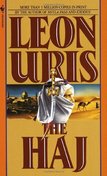
Written in 1984, I believe The Haj has critical relevance to the current events of the day. I read this recently, at the recommendation of a friend, and it has altered my view the troubles in the Middle East. While it is a work of fiction, it is largely drawn from historical events, and delivers an important perspective into the underpinnings of the conflict in Israel.
Set between the years of 1920’s and 1950’s, the story focuses on the Palestinian Arab family of caught up in the historic events of that land and a majority of it is narrated through the eyes of Ishmael, the youngest son of a muktar, the tribal leader of a small village. The Haj portrays the travails of the Arab family of the muktar, where their village sits on a hill which later turns out to be of critical strategic interest, and is on the route to Jerusalem from the Mediterranean coast.
Critics of the book at the time it was released complained that it was slanted in its treatment of the main characters, in favor of the Israeli characters, despite the fact that the main characters were Arab, and had in my view a sympathetic treatment. Being Jewish and the author of Exodus, that claim leveled against Leon Uris with little surprise. The importance of the book for me, however, was the depiction of historical events that had always been somewhat blurred in the emotionally charged discussions of what actually occurred during this time. Therein lies the value of this book. For me, I learned about the contention and competition between the competing Arabs around Palestine who coveted the land for themselves. And when Egypt, Trans Jordan and Syria decided to invade Israel in 1948 it was just as much to carve out a piece of this land for themselves as it was to drive out the nascent Jewish settlement. And in the bargain, the Palestinians, the ones who could not afford to evacuate, were abandoned to their fates having been told by the invading Arab countries that they should leave, or risk annihilation in the invasion. This is where the refugee camps were born, and where the militant movement that plagues the world today.
Set between the years of 1920’s and 1950’s, the story focuses on the Palestinian Arab family of caught up in the historic events of that land and a majority of it is narrated through the eyes of Ishmael, the youngest son of a muktar, the tribal leader of a small village. The Haj portrays the travails of the Arab family of the muktar, where their village sits on a hill which later turns out to be of critical strategic interest, and is on the route to Jerusalem from the Mediterranean coast.
Critics of the book at the time it was released complained that it was slanted in its treatment of the main characters, in favor of the Israeli characters, despite the fact that the main characters were Arab, and had in my view a sympathetic treatment. Being Jewish and the author of Exodus, that claim leveled against Leon Uris with little surprise. The importance of the book for me, however, was the depiction of historical events that had always been somewhat blurred in the emotionally charged discussions of what actually occurred during this time. Therein lies the value of this book. For me, I learned about the contention and competition between the competing Arabs around Palestine who coveted the land for themselves. And when Egypt, Trans Jordan and Syria decided to invade Israel in 1948 it was just as much to carve out a piece of this land for themselves as it was to drive out the nascent Jewish settlement. And in the bargain, the Palestinians, the ones who could not afford to evacuate, were abandoned to their fates having been told by the invading Arab countries that they should leave, or risk annihilation in the invasion. This is where the refugee camps were born, and where the militant movement that plagues the world today.
 RSS Feed
RSS Feed
